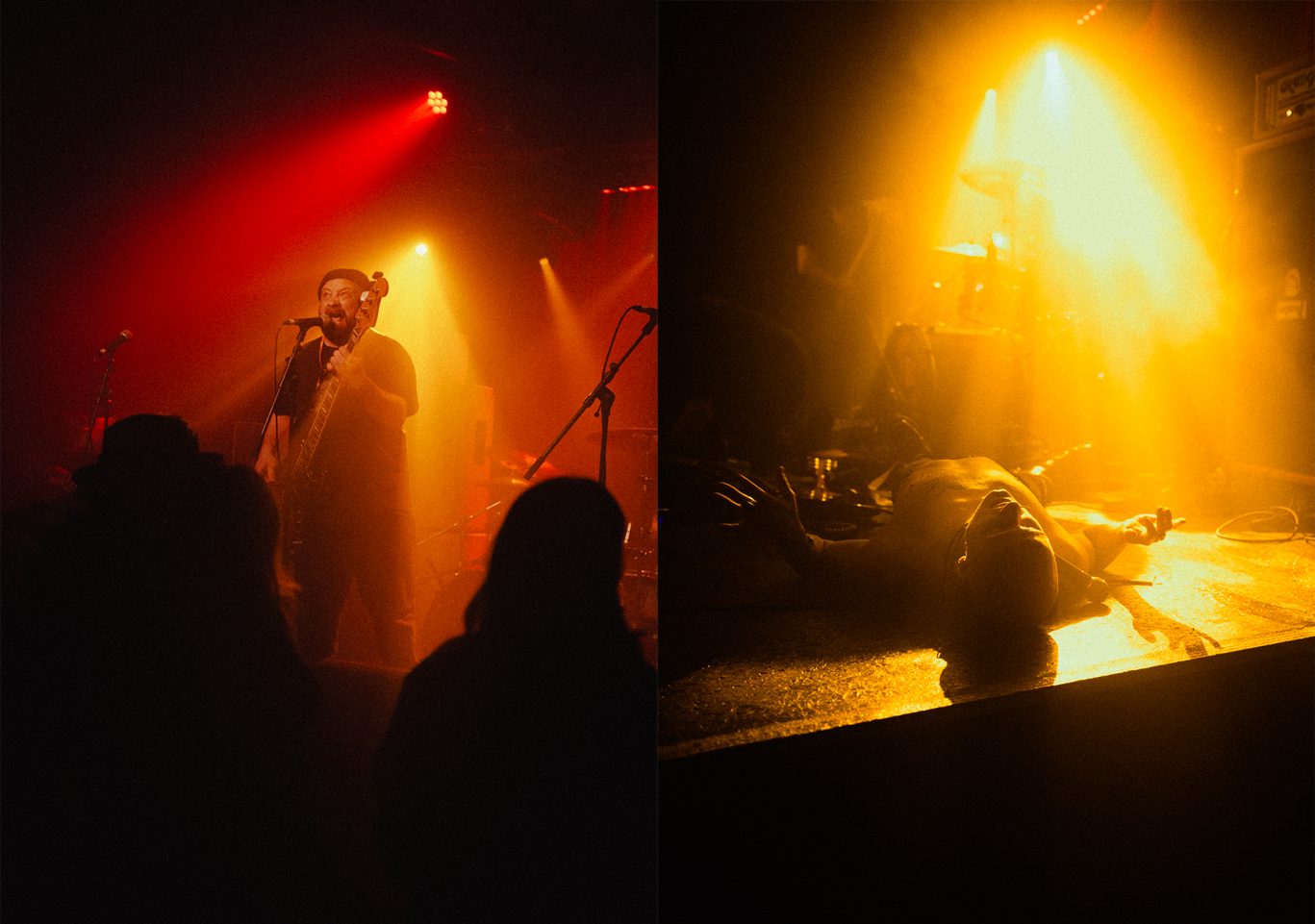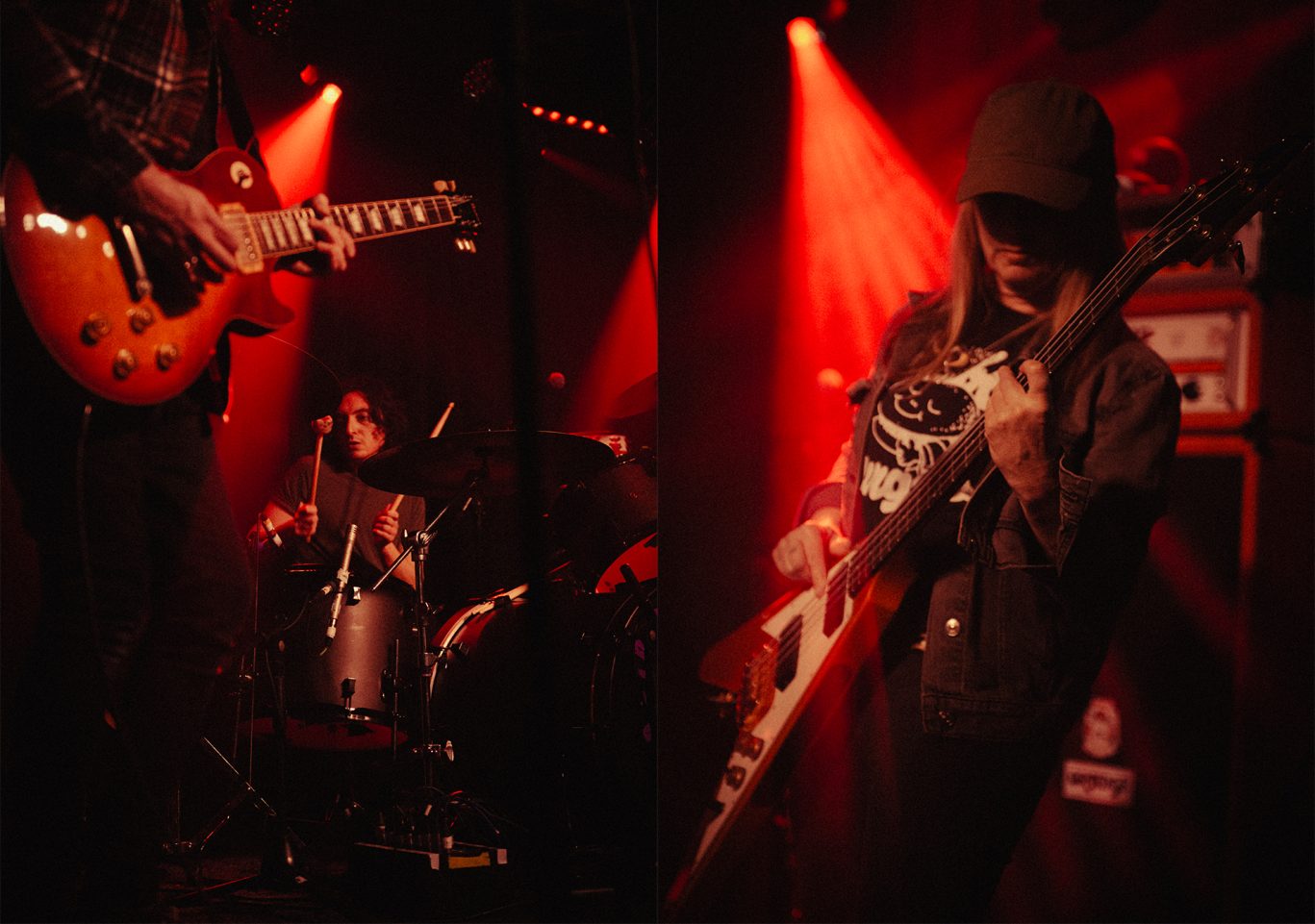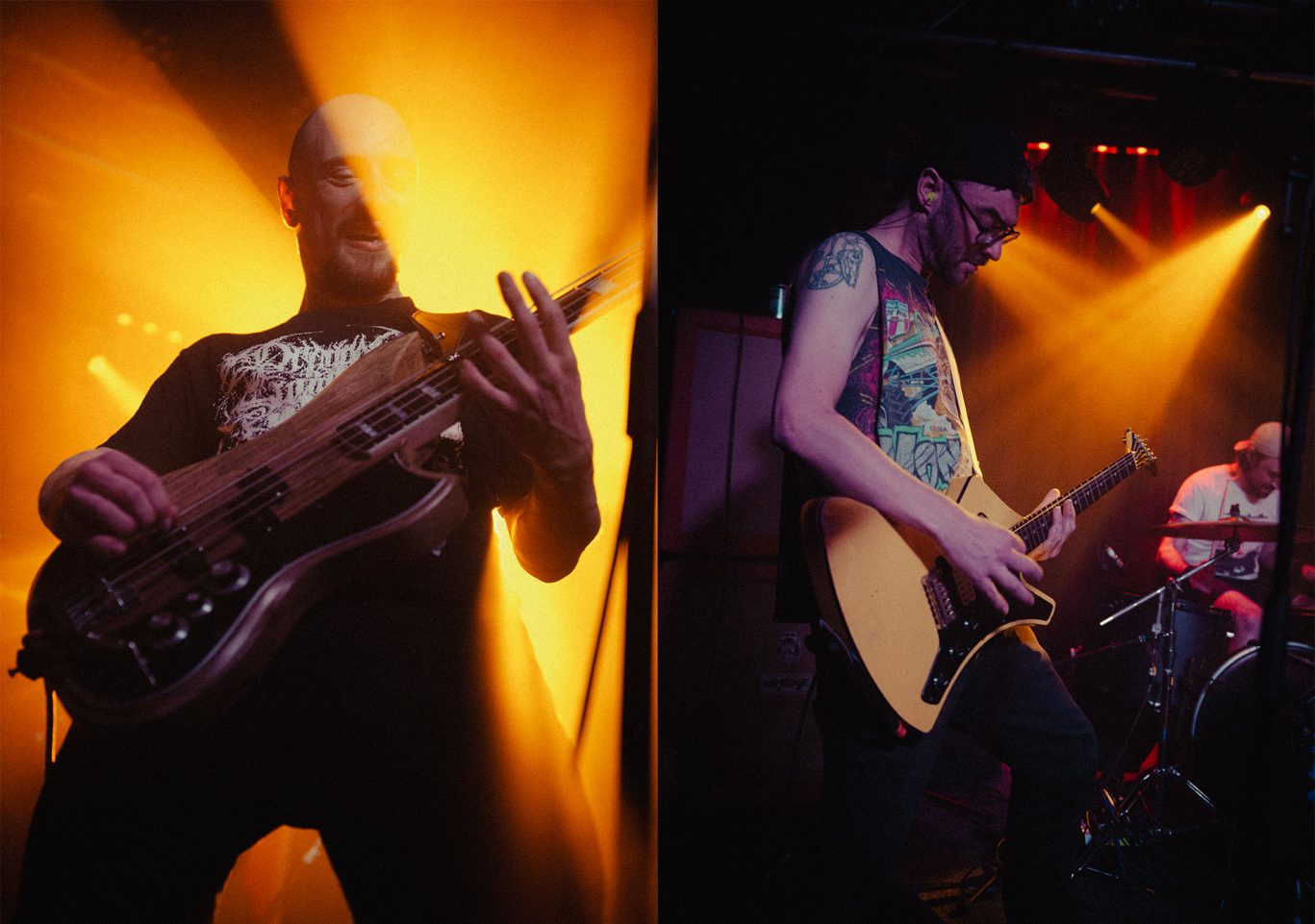Imagine you are in a dark, atmospheric music venue, surrounded by other people. On stage, a band is setting up, focused and determined to nail the soundcheck. They are ready. The first riff hits, then another—slow, deliberate, and intentional. Everything is turned down low and distorted and pushed to the extremes of loudness. Each section fills you to the brim, and every thud of the drums shakes you to the core, making the whole space vibrate as the sound waves travel through it. Doom is sexy. Doom is love. This experience repeats over and over for three days.
I found myself in that exact scenario on the last weekend of February, at what is now a regular metal event in London—the Masters of the Riff Festival, organized by the London Doom Collective at Hackney’s Oslo. Let’s bring this back to the beginning.
“We started London Doom Collective during the 2020 lockdown, and it was sort of an idea to keep the scene that we’re in flowing with the energy because obviously, no one could play any gigs.”
I was chatting with Ollie, one of the organisers. He plays in the band Old Horn Tooth with Chris who joined our little chinwag and also Sean from Troy the Band and The Art of Self Defense, who are as equally involved in the Collective’s day-to-day operations.“We did a compilation called Voices from the Void, which was a compilation of all the bands in the scene at the time in London and around. The idea was to raise money for the music venue trust to support the Black Heart, and places like that, so they could survive and continue being a venue. And then after the first lockdown, we decided to do an all-day, two-day festival at the Dev in Camden, to celebrate all the bands that involved themselves in the compilation and to give back to the scene. This progressed to Masters of the Riff which is in its fourth edition this year. We also put shows on throughout the year, we don’t just do MOTR. This is sort of the start for us, we see it like the beginning of the year, and it’s a really nice time of the year, to get the ball rolling for all the scene.“
Their love for Doom Metal is quite evident through the conversation. But that’s not the only genre they try to embrace. This year we had quite a variety of bands from different backgrounds of metal. “It’s nice to play slow and put on slow music, it’s not so abrasive” – mentioned Ollie. “It’s cool that we’ve all (organisers) got different backgrounds, I think that works for the benefit of the lineup for the festival. Because we have different influences, we don’t have to have just a stoner or rock band, we can have you know, psych, post, all of this. We always try and have a wild card every year – Wasted Death this year and Wallowing last year. Curating a lineup is quite challenging because we like making it slow, but having a wild card is quite good because you can have a black metal band or a thrash metal band .”
I was there for the first time and didn’t know what to expect. London’s metal scene is quite close-knit once you start going to shows regularly, and over those loud three days, I bumped into many familiar, friendly faces. But what made it even more special was leaving on Sunday feeling richer—not just from expanding my community, but also from discovering new bands to obsess over and spending an absolute fortune on merch (feeling rich but financially broke). Ollie summed up my feelings perfectly when I asked the team about their favourite moments.
“Everything is magical, every show we put on, we just meet, and meet all the bands and the scene. One of the things I love the most is just seeing the community, this big family.”
He continued: “It means that people can network at Masters of the Riff or the gigs and you know, ideas spawn from that, you’ll see some friends starting new bands. My personal highlight was, that we put Elephant Tree on last year on Sunday, they did not have a great time in the last few years. So that was like a real highlight and a lot of mixed emotions. Everyone was quite sad and happy in a good way. It’s just seeing supporting the scene and giving a platform for bands to play with other bands and it’s great. Every band that plays is equal to us. You know, we have to curate a lineup, who plays first, who plays last but it’s just giving those bands the sense of their (own), you know, that’s their art, so it’s a great platform for them, and treating them like they should be treated and there’s no egos or any underlying thing that we’re trying to do, it’s just about making the scene stay alive and thriving. That’s really important for us, making it awesome. “
Sean had the same opinion confirming the sentiment that platform for the bands to perform is very important. “I was going to use the Elephant Tree example as well because that was a very special moment. But apart from that, I think the highlight is seeing the festival come together. Takes a lot of work to put it together and coordinate. And then also, when there are some bands that you know that maybe hasn’t played in London very much or at all, they get a really decent stage platform, and you see people really love it, and enjoy it, it’s really cool.” Chris loves to see the festival grow:
“I think, if I had to choose my favourite thing about everything, it’s just the way that the festival has grown over the years, and then the statue that it’s got now, compared to what it was like the first couple of years. It’s really found its place in the market and quite like that side of it. “
I couldn’t help but wonder about the future of MOTR. The team mentioned they would take a couple of weeks off to let the dust settle before getting back to work on next year’s edition—which is already in the works. “I think mentally in my head, I got some ideas about what to do and you start 12 months out and start contacting the booking agents about band’s availabilities and it just kind of goes from there” said Sean. It never stops for them! Ollie continued: “Yeah, Sean, I and Chris are working constantly. We all have jobs and stuff and obviously, we all do our own bands too, we’re doing things. This takes about a year solidly. We’ve got some bands that we’d like to invite. I think the other nice thing is that as the festival grows and more people become more aware of it outside of the London scene, we get more interest from bands or booking agents organically. They contact us and say oh you know have you thought about booking us or booking us for your particular event or whatever, and that’s really nice as well because you can build that relationship with those agents but also to see that they want to push their bands into as well. ”
There is so much potential in what London Doom Collective is doing right now. They are incredibly organized and passionate, with branding that’s completely on point—you can tell they pour their heart and soul into this project. But does bigger always mean better? “I mean I think there are other festivals that exist that kind of cater to much bigger audiences within a similar genre and I don’t see the demand for having multiple festivals of a similar size in London, I could just see this would be too much and I don’t think it would be beneficial for either festival to try and do that – great point from Sean. “(..) like Ollie was saying it’s really nice to have the close-knit, kind of fan base and bands. I think we’re pretty happy working with that at the moment as well. “
I could see a nod from Ollie, he agreed. “We’ve been doing it here (Oslo) for three years and what I’ve noticed this weekend is that from the start of each day, it’s been busy. It shows the progression. People know about the festival. In our first year, the first band had maybe 50 people but at the moment there are 100 people instead. We don’t want to move too fast. We don’t want to mess it up! We’ll eventually reach a point where we might have to consider moving. But it has a lot of logistics and we have to be realistic because we’ve got full-time jobs, and lives, there are only so many emails I can reply to from American bands at 2 A.M. (…) It’s got a nice happy vibe at the moment, so just don’t want to go Gung-ho. Like Sean said you have Desertfest who are the pioneers of all of this so they’re sort of the grandparents of the scene in London and that’s wonderful. You know we want to do our thing and there is a space for everyone. Also cost of living crisis, people have to pay rent – there are only so many festivals you can do.“
Masters of The Riff is a festival I would choose over some of the bigger offerings in the yearly lineup of flashy headliners. What makes it special is the people—a beautiful community that lives and breathes its core manifesto: Doom is Love. I felt it, I heard it, I experienced it. I’ll be back for more next year, and I think you should too. Follow their socials to stay updated on upcoming events, and keep an eye out for the MOTR 2026 lineup dropping later in the year. I can’t wait to see what London Doom Collective has in store for all of us!





















